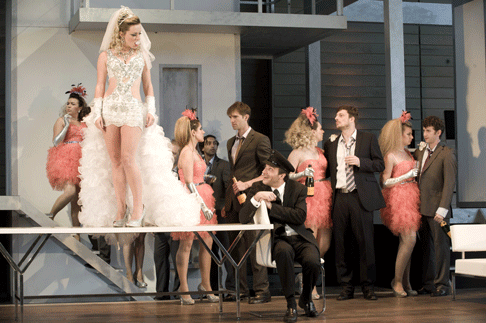09 Jun 2012
Don Giovanni, Garsington Opera at Wormsley
The pavilion at Garsington Opera at Wormsley is stunningly beautiful. Just being there is an experience, which is why the social aspect is so rewarding.

The pavilion at Garsington Opera at Wormsley is stunningly beautiful. Just being there is an experience, which is why the social aspect is so rewarding.
But regular patrons can do bland, corporate affairs any time. They come to Wormsley because they care about opera. This new production of Mozart’s Don Giovanni has a lot to offer to those who pay attention.
The Wormsley Pavilion is a wonder of translucent glass and gleaming metal. It inspires the set design by Leslie Travers. Simple, clean cut lines, stylish elegance. If Don Giovanni were alive today, he’d live in designer surroundings like this. He fits life into compartments, which the “boxes” in this set reflect. But as we know, things go awry. Under this surface glamour lurks something very nasty. Don Giovanni (Grant Doyle) and Donna Anna (Natasha Jouhl) act out bondage games. Naturally, she doesn’t want her father to know. She cuts Don Giovanni from his handcuffs, and he stabs the Commendatore (Christophoros Stamboglis). It’s not a conventional reading but valid. Don Giovanni gets his kicks from seduction, not rape in the modern sense, and those around him are complicit. Besides, Donna Anna’s feelings are conflicted. Her Don Ottavio (Jesús León) is rather alluring and comes over as real match for her. When they masquerade, she wears dominatrix, he dresses as muzzled dog, which expresses much about their relationship.
Because Garsington Opera uses relatively young singers, the production is energetic. Boyle’s Don Giovanni is quick on his feet (as is the character). Joshua Bloom’s Leporello radiates physical presence. Interesting voice, with good colour and range — definitely a future Don Giovanni. When Bloom sings the catalogue aria, he snaps out statistics rapid fire. He prints off a spreadsheet, and reams of paper fill the stage. Donna Elvira (Sophie Bevan) is dumbstruck.
While Natasha Jouhl’s Donna Anna is svelte and sung with richly controlled poise, Bevan’s Donna Elvira is more earthy, even endearing. This brings out the social commentary in the opera. Donna Anna’s is more posh, but she is trapped by her rank in society. She has too much to lose. Donna Elvira on the other hand, seems to be able to roam freely in pursuit of Don Giovanni and declare her feelings openly. Zerlina (Mary Bevan) is “a bit of rough”. Her wedding dress is more showgirl than country virgin, because she has aspirations. Think footballer’s wives weddings. She wants more than the underclass which Masetto (Callum Thorpe) represents, but she puts up with his violence because she has no option. Or perhaps, like a dirtier version of Donna Anna, because something in her draws her to the dark side Don Giovanni offers. Massetto and the villagers sing and move well. You can sense that this lot could riot and wreck Don Giovanni’s spotless cocoon of a penthouse, of they had a chance.
 Mary Bevan as Zerlina and Callum Thorpe as Masetto
Mary Bevan as Zerlina and Callum Thorpe as Masetto
But retribution strikes when the Stone Guest comes to dinner. A corpse resembling the Commendatore is wheeled in on a hospital table. This looks much more like a marble statue than some depictions, and close to text. The inscription is written on a tag. While Don Giovanni and Leporello examine the corpse, a voice booms out from high above the stage, as Stamboglis sings. They can’t see him, but we can. Wonderfully surreal. We don’t need to see Don Giovanni literally dragged down to hell. He drops dead and falls into the same wheelchair with which the Commendatore’s body was removed at the start of the opera. Perfect symmetry. More controversially, Donna Anna caresses Don Giovanni’s corpse. Her emotions are complex. This implies more than a simple happy ending. The Edition used in this production is Barenreiter-Kassel, edited by Wolfgang Plath and Wolfgang Rehm.
Anne Ozorio